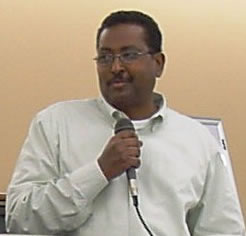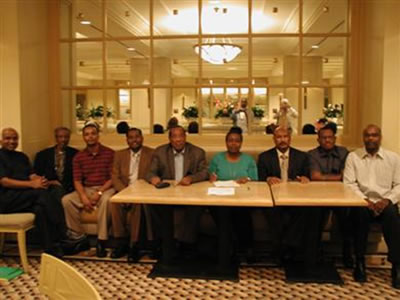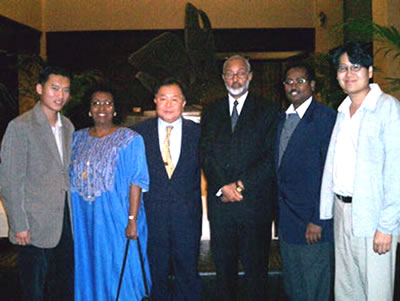fiogf49gjkf0d
by Adan H. Iman
Friday, May 09, 2008
 |
Saeed Meygaag Samatar passed away in California yesterday after a prolonged illness
Send Your Condolences
|
In August 2005, shortly after the SOPRI Convention in LA, I accompanied a visiting official from Somaliland to the UCLA medical hospital where Saeed Meygag Samatar was recuperating from dehydration. In his hospital room, Saeed was lying in the bed receiving fluid through an IV. The conversation was Somaliland centered. Saeed was very engaged in the conversation. He suggested that he would like to bring all the mayors of the regional capitals to the US during the next convention. He said the way to increase the capacities of our municipalities was to increase the knowledge of its officials about the role they are supposed to play by showing them first hand how municipalities in the US provide services to its citizens. I was taken aback because we just came out of a hectic convention and the last thing in mind was about another one. When we were about to leave his room, Saeed got up from the bed and moved the IV pedestal on its reels with him and walked us to the elevators. We tried to discourage him but he insisted on walking us. As we descended to the ground and walked towards the parking lot, I could not take the extraordinary man we left behind off my mind, a man who was in fragile health but who had such strength and positive attitude. His wife, Marwo Amran Muse, said last week that it was his resilience that gave the family sustenance during this most difficult period in their lives. Saeed passed away in San Jose, California on May 7th after a long illness.
Saeed Meygag Samatar was endowed with multiple talents: he was a visionary, shrew entrepreneur, urban planner, thinker, activist and a man with a profound sense of history. He subscribed to the proposition that the history of the past must be a guide to the future, that the mistakes of the past should not be repeated lest the horrors of the past will come back to strike again, that Somaliland had no option but to secede and reclaim its independence, that democracy is the right strategy for the country’s social and economic development, and that democracy is the country’s passport to international recognition.: hence his vigorous involvement in struggle for the liberation and in the quest for its international recognition.
One day in the winter of 1982, when were living together at an apartment in Santa Monica, few miles west of the UCLA campus, Saeed asked me if I could go with him to Washington DC to participate at a demonstration being organized against General Siad Barre, who was due to pay an official to the US. Few months earlier, Siad Barre had imprisoned a group of intellectuals in Hargeisa. They did not commit any crime but, having witnessed the regime’s neglect of meeting the needs of the citizens, organized themselves to see if they could help their people. Their incarceration had galvanized the people and awakened them to the brutality of the military regime. There was always a sense of rightness and morality in all of Saeed’s ideas, then and later on, and I accepted his suggestion. So we flew to a frigid Washington DC during that winter to join others from across the country to harass the ruthless dictator.
During the remaining years of the 1980s, Saeed was passionately involved in raising funds for the SNM, working with others at American universities. In the early 1990s, he founded a non profit organization to collect humanitarian supplies for people returning from refugee camps in Ethiopia to rebuild their lives back in Hargeisa and at other urban centers
It was in the late 1990s that he switched gears and founded the Somaliland Policy and Reconstruction Institute (SOPRI). He laid out an ambitious agenda for SOPRI, which was to promote international recognition for Somaliland, help build democratic institutions as well as capacity building for the public sector and to seek financial assistance for the country.
In an attempt to fulfill the mission of SOPRI outlined above, Saeed held a meeting for those of us in the Greater Los Angeles area in the spring of 2004. He told us that he would like to bring the Foreign Minister and the Minister of Industry to the US and to South Korea with the twin objectives of promoting international understanding of Somaliland democracy and seeking international investment.
We inquired about funding for the trip. Saeed responded that he would obtain funding from his own resources and that of his business associates.
In a high profile trip, the three member delegation arrived in Los Angeles in the summer of 2004, and later on accompanied by Saeed, flew to Atlanta, Washington DC and New York city where they met with State department officials and representatives from multilateral organizations. They returned to Los Angeles and then set off to Seoul, South Korea where they were received by Korean business leaders. Saeed later related to us that the delegation had one time visa to the US and when they went to South Korea, they had to reapply for another visa at the US embassy in Seoul. Saeed said he was a bit worried that they might be sequestered at a hotel for days until the visa was issued. But he was a businessman who knew how to assess risks and get prepared. The visa was fortunately issued right away and they all came back to Los Angeles on time.
Saeed Meygag was responsible in raising substantial portion of the cost of the delegation’s trip; whatever money was raised by the Somaliland communities in the US was just nominal.
It is difficult to measure Saeed’s contribution in the quest for recognition, but there is no question that he helped turbo charge that effort, which was dormant at the time. The trip drove home the fact that the Diaspora communities should not leave that job solely to the government but that they should be actively involved too and, as Saeed had demonstrated, they could give back something to their country of birth.
The following spring 2005, Saeed held another meeting with us. This time he had a more ambitious project. He wanted SOPRI to sponsor a convention in Los Angeles that would bring together representatives of the political parties, government, Diaspora communities , professionals, students, & women, business leaders, NGOs etc. in order to showcase Somaliland democracy, promote Somaliland in the USA for recognition, empower Diaspora communities to create businesses as well as bring professionals, business leaders, families, youth, and women to network for the common good and promote their tradition and culture.
 |
|
Image of Somaliland Democracy created by Saeed Meygag : Saeed is left of Mr. Silanyo. Foreign Minister Edna and leaders of the two opposition parties, Silanyo and Faisal, sign the joint resolution of the 2005 Convention in Los Angeles |
Anybody who had known Saeed would never doubt his abilities. He was a dreamer, a planner and a doer. And so we all pledged to work with him towards a successful convention. The rest of that convention is history. Suffice it to say that David Shin, former US Ambassador in Ethiopia, in his remarks to the convention, said that he was amazed that the logistics of bringing all those people from different parts of the world- Somaliland, South Africa, Middle East, Europe, Japan, Canada, different states of the US etc, - into Los Angeles during the same day was undertaken by private individuals. The fact was that the vast amount of the work for that convention was done by Saeed Meygag Samatar. He conceived, choreographed, produced and directed every aspect of that convention; the rest of us played only minor supporting roles. The level of his involvement was evident by the amount of time he spent in the preparatory work. During the run-up to the convention, those of us in the Los Angeles area remained in regular contact. We noticed that Saeed was so busy on the convention work during the last month or so that he hardly went to his regular work. When we urged him to go to work and make some money for the family, he replied he was fine.
The following summer 2006, Saeed was involved, along with others at the DC Metropolitan Area, in holding another successful convention, equally attended by large number of people, at the nation’s capital.
In 2007 Saeed started circulating draft byelaws of SOPRI. He envisioned an organization with offices in capitals of major countries in the US, Europe and Africa, seeking international recognition and investment opportunities for Somaliland. The project was interrupted by his health condition.
Saeed’s commitment and love for his country of birth was recognized by the President of Somaliland, Mr. Dahir Rayale Kahin, who last October 2007 awarded him a certificate of appreciation, a rare gift to someone in the Diaspora. The President bestowed the honor to Saeed:
“In recognition of the extraordinary commitment you have demonstrated, as the founder and President of the Somaliland Policy and Reconstruction Institute (SOPRI) in raising international awareness about Somaliland’s emerging democracy …and in advocating and promoting the aspiration of the people of Somaliland to gain independent statehood and recognition by the international community as a sovereign and independent state.”
Saeed felt that his dream of a recognized and democratic Somaliland was inching forward. Even though he was not feeling good, he still made the three hour drive from his home in Raleigh, North Carolina to Washington DC to meet the high level delegation led by President Rayale. He said it was an historic visit and he had to go meet them. Similarly, when the assistant secretary of State for African Affairs visited Hargeisa, he was elated.
A compassionate Entrepreneur
Throughout his long quarter of century stay at the Los Angeles basin, Saeed Meygag Samatar refused to work for any body but himself, except for a two year stint as a planning aide- Saeed held a masters degree in urban planning from UCLA- to councilman Robert Farrell (Los Angeles is represented by 15 councilpersons who act as the legislative body of the city government). While some of us opted for the security of guaranteed wages from government agencies, he was determined right from the beginning to establish his own company. Saaed tried different business ventures but finally found his niche with Sustainable Housing Corporation, a company dedicated towards the construction of low income housing.
Saeed built five apartment buildings throughout Los Angeles. He invited us to the ribbon cutting ceremony at the one he built in 1997 on 29 street and Hoover, few blocks from the University of Southern California (USC). The 20 unit two-story building has modern amenities, underground parking for tenants, and a computer room. USC students still go to the building once a week to train tenants on computers.
During the opening ceremony, a large group of people were in attendance- company executives, representatives of the Council District, building contractors, community members. Only Saeed Meygag could have assembled such group. With flags of different colors fluttering behind him and in front of the apartment building complex, Saeed thanked everybody for the role they had played in the construction of the building. He emphasized how the building will provide comfortable living to people with limited income, those who could not afford the skyrocketing rent in Los Angeles. Watching and listening him talk that day gave me a flash back to our days in Lafole College of education where Saeed was president of the student body in the early 1970s, an image of him addressing the students in the campus or briefing visitors about the student’s activities at the Refugee camp at Kurtunwarey, where we were assigned during the resettlement of refugees. He was an accomplished public speaker.
 |
|
Image of Somaliland Democracy created by Saeed Meygag : Saeed is left of Mr. Silanyo. Foreign Minister Edna and leaders of the two opposition parties, Silanyo and Faisal, sign the joint resolution of the 2005 Convention in Los Angeles |
One writer described great men as those who, for better or worse, make difference in the lives of people. Saeed was made of the same material as those who make a difference in people for the better. In his professional life, he was dedicated to helping those with small income obtain decent, humane condition for their children. Tenants of those apartments owe to him for their decent living condition. He was also dedicated to improve the lives of the citizens of Somaliland. He was worried about his people even when he was in poor health.
Saeed envisioned introducing the kind of gated communities that are part of the suburban landscape in the US and Latin America into the African continent. He travelled to South Africa, Uganda and Nigeria to study the feasibility of the project. The idea that he wanted to translate into reality was to build affordable houses -not the prohibitively expensive behemoths we see in Hargeisa- in a gated communities with paved streets, grocery stories, recreational areas and schools. His objective was to create excellent, safe living conditions for families at very affordable, yes affordable, prices. He achieved this goal in Los Angeles. He could have revolutionized housing construction in Hargeisa and elsewhere in Africa if he did not die so young.
Saeed’s insistence to become an entrepreneur paid off. Just by looking at his life style it was obvious that he had achieved the American dream. His office was at a high rise building on Wilshire Blvd in downtown Los Angeles. His huge house, before he moved to North Carolina in early 2006, was located at an upper middle class bedroom community in suburban Rancho Cucamonga , about 40 miles east of Los Angeles. The house was located at a cul-de-sac nestled at the foot of the San Gabriel Mountains. The sub division where they had lived was the ideal community to raise a family: safe, quite and leisurely. It had the qualities of both a town and countryside and seemed to be in union with nature.
Their house was the venue we gathered during Idd occasions and when we were working on projects. Saeed & Amran and their children were always generous to invite members of the Somaliland communities in Los Angeles & San Diego to their home. We, both children and adults, looked forwarded to those occasions because we all enjoyed being with them so much.
But these were the happy days.
Saeed is survived by his wife, Marwo Amran Muse and three boys, Kenadid 19, Yusuf 17 and Warsame 14. During Saeed’s long illness, Amran and the boys conducted themselves with utmost dignity. Saeed bestowed to his family values of love, hard work patriotism, and respect to others. The young boys will hopefully and surely grow up- and we all wish them well- to be like their dad, successful, patriotic and useful members of their people and country.
The Somalilander community in southern California is deeply devastated by Saeed’s passing. We all express our condolence and love to his family and relatives:
1. The family of Mohamed E. Bullale.
2. The Family of Hagi Muse Abdi Mire
3. The family of Hassan Mohamed Adan (Sheef)
4. The family of Hassan Mogeh Hersi
5. The family of Mohamed Ali Ahmed
6. The family of Dr Abdisalam Barre
7. The family of Hussein Farah
8. Bashir Hassan sheekeye
9. The family of Abdirashid Hassan Sheeheye
10. Fadumo Ali Ahmed
11. The family of Gulaid Abokar
12. Amina Nur
13. The family of Khadar Mohamed
14. The family Ismail Muse
15. The family of Mustafa Mohamed
16. Ali Hoori
17 The family of Mohamed O. Farah
18. Hassan Mohamed
19. Muluki Barre
20. Yasmin Ali Gailad.
21. The family of Ismail shamhad
22. The family of Mohamoud Kaba Tole
23. Ibrahim siyad
24. The family of Abeeb jama
25. The family of Omar Ali San Yare
26. Deqa Mohamed Jibril
27. Foziye Alaale
28. Fardooza Muse
29. Mohamed Ismail
30. Abdulaziz Nur
31. Ahmed Mohamed ( kayd)
32. The family of Abdirahman Abu Site
To conclude with a short poem dedicated to Saeed Meygag Samatar:
He was the angel of inspiration
He was the glue holding us together
He the was the band binding us to the rest of the Diaspora
He was the long bridge to the motherland
He was to us the world
He was Saeed Meygag Samatar.
With love and sympathy:
Adan H Iman, Los Angeles
Email: [email protected]